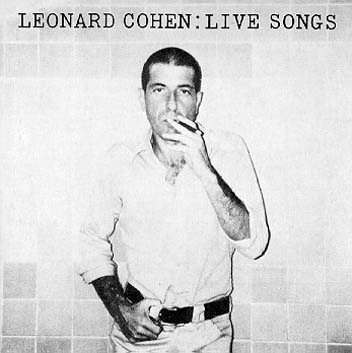
Slightly more fun is Cohen's next studio album, New Skin for the Old Ceremony (1974), but not much more fun. There's the usual plodding self-indulgence, but New Skin has a handful of songs that are considerably more interesting - 'Who By Fire' is a brilliantly creepy, odd little pop song, 'Chelsea Hotel No.2' is absolutely lovely and heartbreaking, and 'There Is a War' is a very strange song indeed, and a brilliant one. However, despite the presence of a backing band, a new development for Cohen's studio work, it's still rather frustratingly drab. We skip forward four albums to 1988's I'm Your Man. Often regarded as one of Cohen's finest albums, there is an entirely different problem with I'm Your Man. With only a couple of glaring exceptions, the songs on I'm Your Man are absolutely fantastic, really great. The difficulty is the truly hideous production, arrangement and instrumentation. I've never heard such a great set of songs be made to sound so utterly awful - everything about the sound is dated in the worst possible way, sampled strings, jingling keyboards, wailing backing singers, and everything processed to within an inch of its life - it's hideous. It's such disservice to the songs that it's a difficult album to listen to, and it's clear why other people have been more successful with songs from the album. 'First We Take Manhattan', 'Everybody Know', 'Tower of Song', these are superb songs (the most egregious exception is 'Jazz Police' which may well rank as my most hated song in terms of both the song and how it sounds) and it's a crying shame the album sounds so godawful.


We skip over 1992's The Future and on to the next album, some nine years later, Ten New Songs (2001). It's a laid back affair this one and it's fairly charming (those synth drums could have done with being jettisoned, but oh well) and it's a less strident attempt to appear to be keeping up with the times. As a result it's a much easier listen, and it doesn't have the air of gloom that he fostered so early on, so much as a seasoned melancholy. If anything it's a delicate reflection on and of the aging artist and it's a much more personable record than many he's made. A lot of this may be down to the large role played by collaborator Sharon Robinson, who handles all kinds of technical duties as well as co-songwriting and duetting throughout the album. It's a subtle, unaggressive record and although the tendancy to just stop listening is pretty strong, it's an album that deserves attention while not demanding it. I really prefer Cohen in this mode to any other.
And so, with the necessity of checking out all of the Eurovision songs before tomorrow's nights big final, it's cheerio for the week.
No comments:
Post a Comment